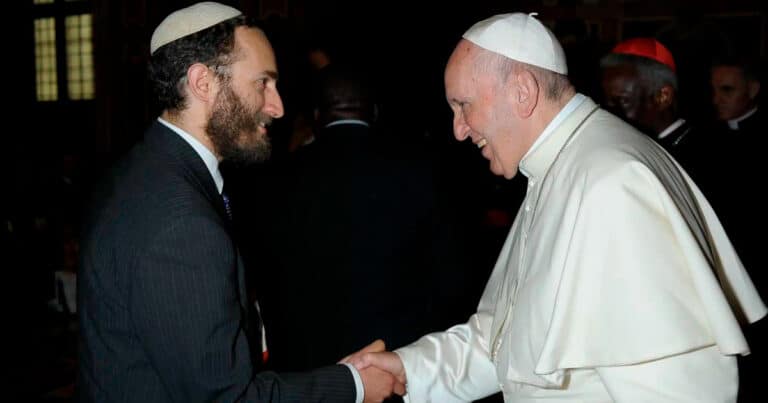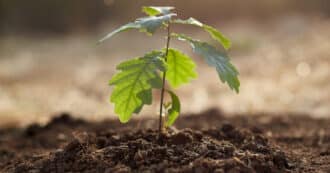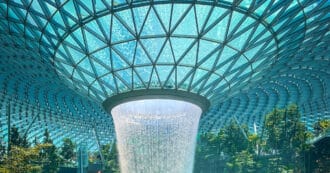I recently met Pope Francis at a Vatican conference titled Laudato Si’: Saving Our Common Home and the Future of Life on Earth. What I appreciate about Pope Francis is that he is a forward-thinking religious leader who is aware of the ecological and spiritual crisis which humanity faces. His Encyclical, Laudato Si’: On Care for Our Common Home, is one of the most powerful articulations of a religious environmental ethic. Caring for our common home shouldn’t be a right or left wing, conservative or liberal issue. It’s a religious issue because this is God’s earth.
In Laudato Si’, Pope Francis critiques such a view, saying, “This has made it easy to accept the idea of infinite or unlimited growth, which proves so attractive to economists, financiers, and experts in technology. It is based on the lie that there is an infinite supply of the earth’s goods, and this leads to the planet being squeezed dry beyond every limit.” (Laudato Si’, Paragraph 106).
Yet Pope Francis’ advocacy has been strongly opposed by a number of Catholic Cardinals and Bishops, especially in the United States. This opposition stems in part from a religious view that people should dominate nature, and that there is no limit to our taking from nature. Such a worldview has helped support the views of conservative Catholic Supreme Court justices– Thomas, Roberts Jr., Kennedy, and Alito, the recently deceased Scalia, and the nominated Kavanaugh.
The most significant schism in the 21st century Catholic Church concerns care for our common home. While Pope Francis demonstrates tremendous leadership for a sustainable future, this Catholic conservative majority on the Supreme Court in 2016 ordered the EPA to halt enforcement of the Clean Power Plan that was set to reduce U.S. greenhouse gas emissions. Such an approach may continue for decades to come. As The New York Times reported, Judge Kavanaugh “has repeatedly taken a skeptical approach to Environmental Protection Agency regulations attempting to address greenhouse gas emissions using a clean-air law crafted before climate change had emerged as a major policy concern.”
But it’s not just about a schism among Catholics. This divide in the Catholic Church is paralleled in most other religions, including my own. There are many religious clergy and practitioners who support the prominence of corporate power and the spread of consumer culture. Most faith adherents (with the exception of indigenous religions, Jainism, and Baha’i) exhibit a divide in regards to care for our common home. The Ecumenical Patriarch of the Orthodox Church has been a champion of faith-based ecological sustainability for 300 million Orthodox Christians, despite the apathy and opposition from other religious leaders within the Orthodox Church. Dozens of Muslim sheiks and imams spoke at the launch of the Islamic Climate Change Declaration in Istanbul, despite the apathy and opposition from other Muslim religious leaders. Dozens of rabbis signed a Jewish Climate Change Declaration, despite the silence of the Chief Rabbis of Israel on the topic of ecological sustainability. And hundreds of Hindu swamis call for ecological harmony and balance, while the Hindu-inspired BJP party promotes a pro-business agenda.
The sharp divergence of views among prominent Catholics reveals how the ecological crisis is not primarily about climate and oceans and forests, but about theology and interpretation of Scripture. Countless religious clergy and faith adherents embrace the growth paradigm and remain skeptical of environmental science. Most of the six billion people on earth who identify with a religion have yet to hear faith-based guidance for living sustainably. And until they do, humanity will continue to push the earth to its breaking point. For the 2.2 billion Christians and 15 million Jews who look to the Bible, much depends on the interpretation of key verses like Genesis 1:28 and 2:15 that relate to dominion, stewardship, and relationship with God’s creation.
Conference convener Cardinal Peter Turkson, president of the Dicastery for Promoting Integral Human Development, spoke about how the first chapter of Genesis emphasizes God ordering creation. The word ‘cosmos’ means an ‘orderly arrangement,’ indicating that God created this world as an embodiment of harmony in an ordered way, with laws of nature. Dr. Bill Mckibben spoke about how according to many climate scientists, 350 parts per million (ppm) of carbon dioxide in the atmosphere is the upper limit of what the atmosphere can take for there to be a stable climate on earth. Humans have pushed that level from 280 ppm at the beginning of the industrial revolution to 410 ppm today. With current consumption, it may rise to 500 ppm in the coming decades. We are upsetting the order of God’s world.
Rabbi Yehuda HaLevi Ashlag, a leading kabbalist of the twentieth century, wrote that God established the laws of nature in the world, and a person or society that transgresses one of these laws will be punished by means of nature. He likens nature to a judge God established to punish those who violate the laws of nature.
Pope Francis quoted Saint John Paul II in a similar vein: “Once the human being declares independence from reality and behaves with absolute dominion, the very foundations of our life begin to crumble, for ‘instead of carrying out his role as a cooperator with God in the work of creation, man sets himself up in place of God and thus ends up provoking a rebellion on the part of nature'” (Laudato Si’, paragraph 117).
My hope is that religious leaders, clergy, and adherents around the world will understand the urgent need to bring back harmony to God’s creation. We are all in this together, and the time to act is now.





